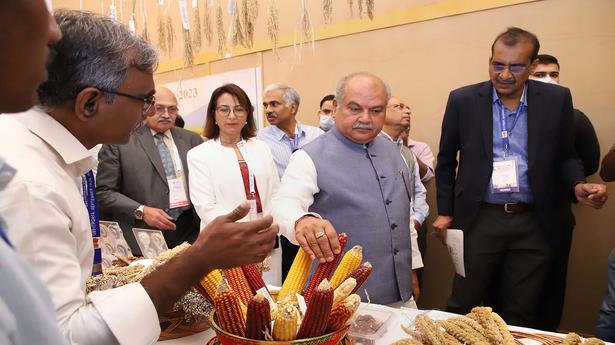Ninth session of ITPGRFA discusses counting on crop variety, genetic assets to handle issues attributable to local weather change
Ninth session of ITPGRFA discusses counting on crop variety, genetic assets to handle issues attributable to local weather change
No negotiation is feasible at the price of meals safety, introduced Union Agriculture and Farmers Welfare Minister Narendra Singh Tomar on the ninth session of the governing physique of the Worldwide Treaty on Plant Genetic Assets for Meals and Agriculture (ITPGRFA) on Monday.
“All worldwide boards should not neglect that meals is a vital basic proper. Creating nations will probably be motivated by the necessity to make sure that the rights of farmers producing meals are by no means compromised,” he stated, including that the wrestle for local weather resilient agriculture and dietary safety relies upon closely on the selections and actions of the signatories.
Mr. Tomar additionally talked about plant genetic assets being the supply of answer to breeding challenges. “We should use all fashionable applied sciences in addition to conventional information to protect and use them in a sustainable method,” he stated.
Following Mr. Tomar’s inaugural deal with, Union Agriculture Secretary Manoj Ahuja stated that deliberations within the session should result in a steadiness between genetic assets governance and use, funding and innovation, and entry and Profit Sharing to attain future-ready options for agriculture and meals safety.
QU Dongou, Director Normal, FAO, who joined the session nearly, stated the meet is celebrating smallholder farmers as guardians of crop variety. “They’re meals heroes and their contributions should be recognised. The world is heading for a inhabitants of 9 billion. On the identical time, the impacts of the local weather disaster and biodiversity loss are placing stress on agriculture. We should feed extra individuals with much less, with fewer inputs and safeguarding our pure assets,” Dr. Dongou stated.
The pandemic and ongoing conflicts are affecting the best way the world produces, provides and consumes meals, he identified. “They’ve proven us how fragile our agri-food programs are and have put our world provide chains below stress. To take care of these challenges, we should enhance the usage of various and resilient crops and their genetic assets. We should preserve the supply of our meals and agriculture, our seeds and different plant genetic materials. The way forward for meals is dependent upon it,” he added.
Dr. Dongou stated the private and non-private sectors, farmers and academia have to put within the effort to make use of genetic variety and sustainability, and guarantee they’re made obtainable for breeders and researchers to allow innovation. “It’ll permit us to adapt our crops to the rising impacts of the local weather disaster, and be extra resilient to shocks in provide chains. The treaty is central to attaining these aims. However to take action, we want capability improvement, stable establishments and robust partnerships,” he stated.
He provided help to the efforts to get all FAO (Meals and Agriculture Group) members to enroll to the treaty. “Making the Treaty really common will assist to make sure that agricultural variety is saved, shared and cared for. We should preserve this treasure for our descendants, for the meals safety of present and future generations, and for the improved resilience and preservation of our planet,” he added.
The ITPGRFA was signed through the thirty first session of the United Nations Meals and Agriculture Organisation (FAO) in Rome in November, 2001. The treaty seeks to attain meals safety by means of the conservation, alternate and sustainable use of the world’s Plant Genetic Assets for Meals and Agriculture (PGRFA), equitable sharing of income from its use, in addition to enjoying an vital function within the recognition of rights of farmers.



/cloudfront-us-east-1.images.arcpublishing.com/tgam/MPSLXYW6HVMSZOCY72MGBQYZIQ.JPG)